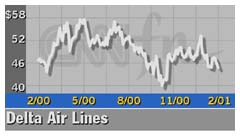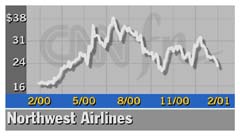|
Delta pilots OK strike
|
 |
February 12, 2001: 6:02 p.m. ET
Pilots of No. 3 airline could walk April 1, but Bush may end any airline strike
By Staff Writer Chris Isidore
|
NEW YORK (CNNfn) - Pilots at Delta Air Lines, the nation's third-largest carrier, have voted overwhelmingly to go on strike as soon as April if they do not reach a contract agreement with management there, although airline and government officials as well as stock analysts cautioned that a strike at Delta is a long way from takeoff.
The Air Line Pilots Association (ALPA) union said about 99 percent of nearly 10,000 pilots represented by the union took part in the strike vote and that 97 percent of those voted to authorize a strike. The approval of a potential strike was expected.
"Through this strike ballot, the Delta pilots have demonstrated overwhelmingly that they are unified and ready to leave the cockpit, if necessary, to achieve the contract we have earned and deserve," said Charles Giambusso, a Delta captain and chairman of the union's bargaining unit at Delta. "The ball is now in management's court. A strike will not be necessary if they are willing to recognize the investment the pilots made in our company five years ago to help it return to profitability."
 A spokeswoman for the airline said it is still hopeful that an agreement can be reached without any strike or other disruption of flights. A spokeswoman for the airline said it is still hopeful that an agreement can be reached without any strike or other disruption of flights.
"It (a strike vote) is standard practice at this stage in labor negotiations," said Alesia Watson, spokeswoman for Delta. "It does not imply that a strike is imminent or inevitable."
Delta (DAL: Research, Estimates) and pilots have agreed to ask the National Mediation Board (NMB), which oversees labor relations in the airline industry, to declare a 30-day "cooling off period" if an agreement is not reached by Feb. 28, a move that could release the pilots to strike as soon as April 1.
Bush could end strike
But under the labor law that controls labor agreements in the airline industry, President Bush can order an immediate end to any strike for 60 days, and creation of a "Presidential Emergency Board" that would be charged with finding a settlement during that period.
The White House issued a statement Friday that it would take that action if mechanics represented by the Aircraft Mechanics Fraternal Association at Northwest Airlines (NWAC: Research, Estimates), the nation's fourth-largest carrier, do not reach a settlement within the 30-day cooling off period that began at that airline Friday.
While PEBs are common in the railroad industry, which is covered by the same labor law, they are exceedingly rare in the airline industry. Only one has been used in the last 33 years in the airline industry.
There are also labor negotiations nearing a head at United Airlines, the nation's largest carrier, and American Airlines, the No. 2 U.S. airline. The brief White House statement did not refer directly to negotiations other than those at Northwest, but a statement from the press secretary suggested action was a strong possibility in all four cases.
"The President is very concerned about the possibility that four major airlines may all be struck at approximately the same time," said Ari Fleisher, the White House press spokesman, in response to a question Friday. "He thinks, particularly given the softness in the economy right now, we need to be very careful that that does not take place."
Still, Frank Duggan, the chairman of the NMB, points out that it is the board that recommended the president name a PEB in the Northwest case, and that President Bush was not the one pushing for such action. He told CNNfn.com Monday evening that industry observers should not assume that the new administration is eager to act to end airline strikes.
"President Bush has said he takes seriously any threatened disruption of service," Duggan said. "But my guess is that part of Republican ideology is not to meddle in the marketplace."
Duggan said a PEB is warranted in the case of Northwest because the two sides seem so far apart, and because some of the other negotiations are stalled while the two sides wait for the outcome of the Northwest agreement.
"We had some of the most experienced mediators spending over 100 days on this," he said. "It got to the point where we couldn't make a deal. That's our role, to make a deal, we don't pick winners or losers."
Duggan said it is too early to predict what the NMB's recommendation would be in talks at Delta, United and American.
"I don't necessarily think any will require a cooling off period or presidential emergency board," he said.
Presidential intervention seen as blow to unions
After the 60 days under a PEB, the unions would again be allowed to strike if there is not a labor agreement. Some have suggested that could actually hurt management, pushing the chance of a strike into the busy summer travel season. But Congress could prevent a strike at the end of the PEB by voting to impose a settlement on the two sides.
In the current airline labor talks, the imposition of a PEB is seen as an anti-labor move, as it reduces the threat of a strike on management and on the union's bargaining leverage.
 "The intent of the cooling off period is to put further pressure on both parties to get the job done," said Gordon Eldridge, treasurer of AMFA Local 33, the largest mechanics local at Northwest. "The problem is it (the PEB) takes the bargaining away from us." "The intent of the cooling off period is to put further pressure on both parties to get the job done," said Gordon Eldridge, treasurer of AMFA Local 33, the largest mechanics local at Northwest. "The problem is it (the PEB) takes the bargaining away from us."
Eldridge said the AMFA did not wish to hurt Northwest by taking a strike vote before it was in a cooling off period because it did not want to hurt customer bookings at Northwest. He said he's worried that the White House statement will hurt the union's bargaining position, though.
Northwest, by contrast, issued a statement Friday evening praising President Bush's statement.
"The decision by President Bush assures our customers that for at least the next 90 days their travel plans will be unaffected while we continue our efforts to reach agreement on a new contract for our mechanics, cleaners and custodians and that no strike or other job action is imminent," said the statement from Doug Steenland, the airline's executive vice president and chief corporate officer. "We will be working diligently to achieve a new contract during this period."
Stock analysts also believe that management would be the winner due to President Bush's willingness to use a PEB.
"We view the move by the Bush presidency as a positive development for airlines and consumers as it should mitigate the industry's chronic labor disruptions," said Michael Linenberg, analyst with Merrill Lynch. "In our view, the perceived likelihood of a PEB being appointed should help facilitate protracted negotiations at other carriers. In fact, we would not be surprised if the renewed use of PEBs results in a shifting of the balance of powers -- from unions to airline management. If that were the case, consumers would unequivocally be the biggest winners."
He told CNNfn Monday that Delta and Northwest could possibly see some customer defections because of fears of a strike in the coming months, even if the White House statement reduces the chance of a strike.
"I think the consumer has had enough of the disruption and I think it has had a pretty meaningful impact on the industry's bottom line," he said. "The fact he (President Bush) stepped in and already declared his willingness to appoint a presidential emergency board hopefully that sends a signal to other contract negotiations going on that the president means business." (342KB WAV) (342KB AIFF)
The problem of airline delays and disruption was also highlighted Monday by a Transportation Department report that found the airline industry has failed to address the most deep-seated cause of dissatisfaction -- flight delays and cancellations -- despite other improvements in customer service.
Delta pilots vow to continue to seek contract gains
Karen Miller, a spokeswoman for ALPA at Delta, said the pilots union is not convinced that a PEB would be named if the pilots struck Delta.
"The PEB is a situation out of our control," said Miller. "We hope we would be able to use our rights. We believe the fact that both Delta management and ALPA have agreed to ask to be released, that it should allow the process to move forward."
Delta's Watson said she couldn't comment on whether the airline would seek a PEB if the pilots struck, though she said management would do everything it could to assure that passengers' plans were not disrupted.
"We think the announcement by the White House is instructive, because it clearly demonstrates the president is fully engaged on the subject and is fully aware of the economic consequences that could result from a strike interrupting service at a major airline," she said.
Pilots at Delta insist that the lucrative contract won by pilots at United last year, and Delta's promise of providing its pilots with an industry-leading contract, should give them much of what they want in terms of pay even if a PEB is named there. ALPA is asking for raises of between 25-to-40 percent, depending upon seniority and type of aircraft.
"In some respect, it (a PEB) just delays the inevitable," said one Delta pilot, a former union representative, who spoke on the condition his name not be used. "Whether its management or a mediator or presidential emergency board or even congress, someone is going to have to look at that (United agreement) as the new status quo. That's what they're going to have to meet."
Unions have different clout
Bush had little labor support in his election bid. ALPA, which has generally been seen as more Republican than most unions, endorsed Vice President Gore, partly because of fears that a Bush administration would come in to the side of management in labor disputes, according to George Hopkins, a professor at Western Illinois University and an expert on ALPA.
"Bush's father was notorious for being against airline unions in ALPA's view," said Hopkins. "In 1992, they endorse a presidential candidate for the first time and they endorsed Clinton out of pure fury at the elder Bush."
Still ALPA is a member of the AFL-CIO, as is the International Association of Machinists, which represents mechanics involved in labor talks at United. The AMFA, which represents the Northwest Mechanics, and the Association of Professional Flight Attendants, which represents the flight attendants at American, are not AFL-CIO members.
The only PEB in the airline industry in the last 33 years was in the case of a strike by an independent pilots union at American Airlines in March 1997, and it was a imposed by the labor-friendly President Clinton. By contrast, Clinton allowed the ALPA-represented pilots at Northwest to strike for 15 days in August, 1998 without declaring a PEB.
Shares of Delta slipped 14 cents to close at $44.70 in trading Monday, while shares of Northwest gained 38 cents to $23.06. 
|
|
|
|
|
 |

|

